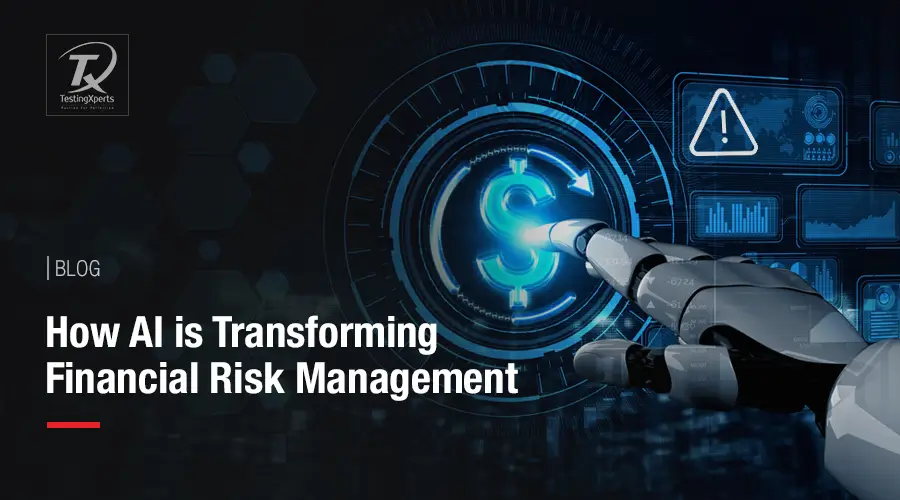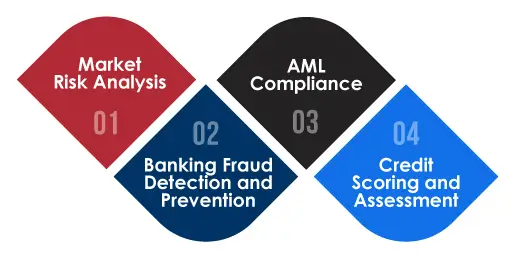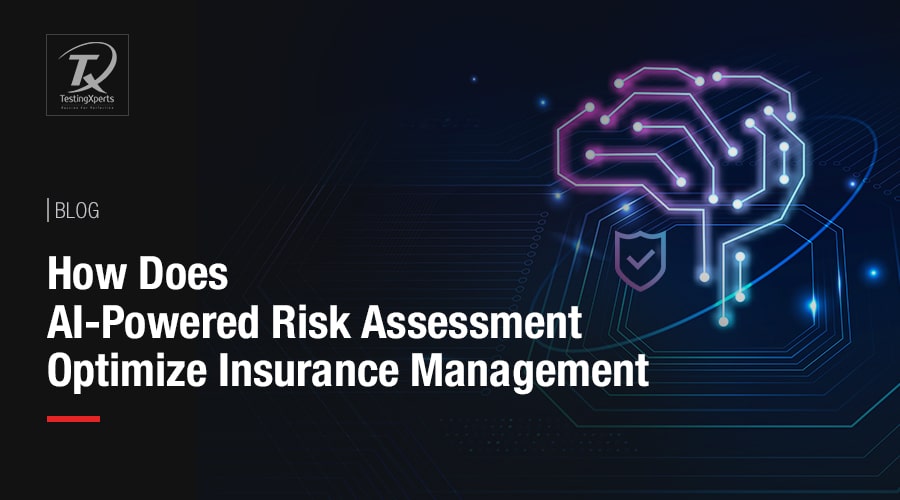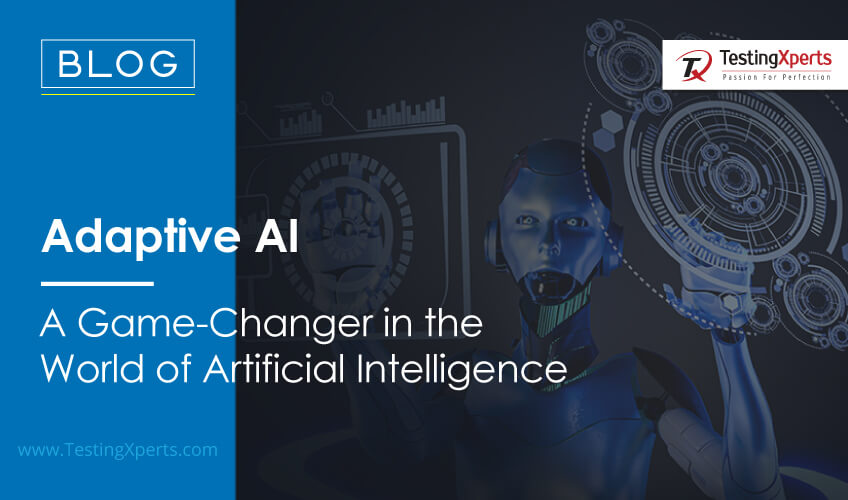
- AI in Risk Management
- Role of AI in Financial Risk Management
- Challenges of Implementing AI in Risk Management
- Future of AI in Risk Management
- How Can TestingXperts Help with AI Implementation in Risk Management?
- Summary
According to studies, the AI risk, security, and trust management market is projected to reach $7.4 billion by 2032 with a CAGR of 16.2%. In the finance industry, AI and ML techniques are automating process automation at the front and back offices and improving overall customer experience. AI is transforming financial risk management by improving decision-making and enhancing efficiency. Machine Learning assists with risk assessment by enabling systems to analyze vast datasets, identify patterns, and make accurate predictions.
Employing AI-enabled risk management strategies can help businesses gain competitive benefits by predicting and remediating issues, improving decision-making, and protecting operations and assets. This technology has become vital in developing and implementing robust risk management strategies across industries.
AI in Risk Management

Leveraging AI in risk management offers various business benefits by improving efficiency and precision. This is crucial for industries like finance to identify potential threats and make swift decisions. AI-powered predictive analytics and data-driven insights would allow them to predict and prepare for risk scenarios, reducing the percentage of sudden setbacks. AI also helps automate complex risk assessment tasks, allowing human resources or teams to focus on strategic business planning and innovation. It sets new benchmarks in IT risk management practices, allowing financial institutes to stay ahead of the curve.
Integrating AI in risk management also represents a significant shift towards the proactive approach. Businesses can easily anticipate and handle risks, contributing to strategic planning, sustained growth, and operational resilience. It would help create a stable and secure operational ecosystem for future processes.
Role of AI in Financial Risk Management

Following are some practical applications that explain the role of AI in financial risk management and how it can transform traditional assessment and control:
Market Risk Analysis
Financial analysts can accurately predict market volatility by leveraging AI systems to process vast market data and detect patterns humans overlook. For instance, they can use AI to analyze social media trends and predict market shifts. AI will alert investors about potential opportunities and downturns, which will help them design their trading strategies. Investment firms will benefit from AI insights to anticipate risks and make faster and more informed decisions in volatile markets.
Banking Fraud Detection and Prevention
Banks can combat fraud by leveraging AI-driven risk management solutions. It would help them monitor and analyze transactions with deep precision. For instance, there’s a scenario where AI systems detect irregularities in a customer’s credit card. The detection mechanism will flag this as potential fraud and alert the security team to verify the transaction’s legitimacy and safeguard the user’s assets. By leveraging AI benefits, banks can avoid scammers and enhance financial security and customer loyalty.
AML Compliance
AI applications upscale the anti-money laundering process by scrutinizing transaction patterns to detect suspicious activities. They also identify irregular large transfers to begin immediate investigations and ensure compliance with AML regulatory standards. AI also helps improve the speed and accuracy of money laundering detection activities.
Credit Scoring and Assessment
AI-driven risk management can assist financial institutes evaluate loan applications more deeply and precisely. AI systems analyze large datasets to categorize transaction histories, financial behavior, and savings patterns. It can also incorporate non-traditional data, such as online purchasing behavior or past payment data. Doing so mitigates financial risk and allows financial institutes to make better decisions about loan approvals.
Challenges of Implementing AI in Risk Management

Even though AI has various applications in financial risk management, there are two major drawbacks that require your attention. The first is the implementation cost, which is expensive. AI needs to process and analyze large datasets scattered across servers or systems. Even if someone is using cloud-native services, it’s still costly. Customized AI services for risk management applications can also cost a lot.
The second issue is privacy concerns. Risk managers and security teams in the finance industry are always concerned about data privacy issues with AI/ML. If AI tools inappropriately use personal data, it can harm the company’s face as they have to deal with legal, reputational, and compliance risks. This is why data that financial institutes leverage for risk management requires strong data protection controls such as obfuscation, encryption, tokenization, and transport security.
Future of AI in Risk Management
Despite the above-mentioned challenges, AI will play a significant role in the financial risk management process. As cloud-based AI and ML services are becoming common in the business industry, financial risk management teams will benefit significantly from dataset’s rapid processing and analytics. This would also help remove the limitations of the manual risk analysis and management processes. Then, there are GenAI technologies that will enhance risk management activities by assisting in tasks like stakeholder communication, data monitoring, and risk assessment.
How Can TestingXperts Help with AI Implementation in Risk Management?

Implementing AI into your risk management processes could be challenging regarding data quality and availability, regulatory compliance, cybersecurity concerns, bias and fairness, and more. TestingXperts (Tx) offers comprehensive AI consulting services that can help you seamlessly integrate AI-driven risk management solutions. Our tailored approach would consist of the following:
AI Strategy Formation
Our experts will evaluate your current infrastructure, tech readiness, and data quality to adopt AI solutions. Based on the assessment, Tx experts will develop a strategic plan to integrate AI into your risk management framework, ensuring alignment with your business objectives.
AI Implementation
We leverage AI-powered testing tools and in-house accelerators (Tx-Automate, Tx-SmarTest, etc.) to optimize the efficiency and accuracy of your software testing process, ensuring secure AI implementation. Our experts ensure that your AI solutions are seamlessly integrated with your risk management systems, maximizing operational efficiency and minimizing disruption.
Data Management and Analytics
Tx carefully analyzes your data to identify and rectify issues and ensure its completeness and accuracy. Leveraging AI capabilities, we enable real-time monitoring and analysis of risk factors for better decision-making.
Compliance and Governance
We ensure your AI implementation complies with industry regulations and standards, focusing on transparency, fairness, and accountability in AI-driven risk management processes.
Continuous Monitoring and Support
We offer continuous monitoring of AI systems to detect eros and ensure optimal performance. Our experts provide ongoing support to address issues promptly and ensure the sustainability of AI solutions in your risk management framework.
Summary
Businesses are exclusively shifting towards AI, and the finance industry is no different. They are investing heavily in AI technologies for products and application QA. Key applications include market risk analysis, fraud prevention, AML compliance, and credit assessment. AI-powered solutions allow financial institutions to analyze large datasets, identify patterns, and make informed predictions, fostering stronger risk management practices. But there’s a huge gap between the skills and resources needed to put it to use. At Tx, we assist businesses in bridging this gap with our AI consultancy services, streamlining their digital testing evolution journey. Contact our experts to know how Tx can assist you in implementing AI in financial risk management.
Discover more
Get in Touch
Stay Updated
Subscribe for more info




